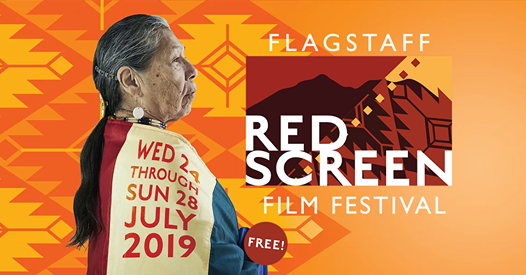July 11, 2019
Northern Arizona University and The University of Arizona have collaborated to create a five-day film festival celebrating Indigenous world cinema. The inaugural Flagstaff Red Screen Film Festival includes the Arizona premiere of Indigenous-produced or -focused films from Canada, Australia, Scandinavia and the U.S., post-screening discussions, appearances and talks by film industry professionals and spotlights on influential figures and films. The festival will take place July 24-28 at the Harkins Theatres Flagstaff 16 and the Museum of Northern Arizona.
Red Screen Festival co-director and NAU librarian Shepherd Tsosie (Diné) said NAU was eager to partner on the festival as part of its mission to become to leading institution serving Native Americans and because it saw the need for a venue in northern Arizona, specifically, to host Native American and Indigenous cinema.
“Film has the potential to reach and communicate to a broad audience; Native American and Indigenous filmmakers have done just that with their incredible storytelling abilities,” Tsosie said. “The Red Screen Film Festival showcases these stories and seeks to bring about deeper understanding and awareness of the lived experiences of Native and Indigenous peoples around the world. Flagstaff provides a relevant venue for displaying these stories and lends to a culturally rich experience for students of NAU and for the broader Flagstaff and northern Arizona communities.”
The festival—proposed by Vicky Westover, director of the UA Hanson FilmTV Institute—was a natural expansion for Tsosie, who works at Cline Library and hosts annual Native and Indigenous film series. To offer a broader film selection to larger audiences, Cline and the UA Hanson FilmTV Institute are co-presenting The Red Screen Film Festival. Since October, Tsosie and Westover have worked together to make the festival a reality with the help of several lead sponsors, including NAU’s College of Arts and Letters, the UA College of Fine Arts, NAU Office of the President and the UA School of Theatre, Film & Television. Additional support has been provided by the Museum of Northern Arizona, NAU’s Native American Cultural Center, NAU’s Department of Comparative Cultural Studies and the NAU Office of Native American Initiatives.
“For Native filmmakers and audiences alike, the opportunity for films like this to be seen is a really important way of building a sense of community, especially when there are so few Native voices reflected in mainstream media,” said David Church, lecturer of comparative cultural studies. “The department is very pleased to help out with this initiative that benefits NAU’s strategic goal of outreach to Native Americans and helps bring a wider range of Native voices to local screens.”
Church sits on the festival committee with fellow department lecturer David Gray and former tribal leader Octaviana Trujillo (Yaqui), who also is founding chair and professor of the Department of Applied Indigenous Studies. Trujillo will lead a number of post-screening discussions throughout the festival. Church said he and Gray offered their documentary cinema expertise when screening entries for the festival but respected the limits of their perspectives.
“It was very important to us that we were only a few of the voices on the programming committee since an Indigenous film festival should be primarily programmed by and for Indigenous peoples themselves.”
The resulting selection is a showcase of Indigenous film spanning genres and formats from both established and up-and-coming filmmakers throughout the world.
Emmy-nominated director Sydney Freeland (Diné) will be spotlighted with an encore screening of her first feature film “Drunktown’s Finest,” a drama focusing on the lives and struggles of three Navajo youth. “SGaawaay K’uuna/Edge of the Knife” will make its Arizona premiere at the festival. Gwaii Edenshaw (Haida) and Helen Haig-Brown (Tsilhqot’in) directed the feature film, which is the first to use dialogue spoken entirely in dialects of Haida, an endangered language spoken by fewer than 30 people in the world. Freelance filmmaker Dustinn Craig (White Mountain Apache/Navajo) will discuss his experiences in the film and television industry in the presented talk “Indigenous Storytelling and Self-Representation.”
The festival also includes a tribute to late filmmaker and Flagstaff local Jake Hoyungowa (Diné/Hopi). Words of remembrance will be followed by a screening of the short film “The Adventures of Jake ‘Hepwesa’ Hoyungowa.” Additionally, a Focus on Navajo Filmmakers will show a series of contemporary short films that tell the Native American narrative in authentic, diverse voices.
“My hope with this film festival is that the films, because they depict a realistic view into the lived experiences of contemporary Native American and Indigenous peoples, allow the audience to leave with a deeper, more accurate understanding of our lives and who we are,” Tsosie said.
Festival Schedule
July 24, 7 p.m.
- “Drunktown’s Finest”
July 25, 7 p.m.
- “Warrior Women”
July 26, 7 p.m.
- “Sweet Country”
July 27
11 a.m.
- Dustinn Craig with the talk “My Career as a Native Filmmaker: Indigenous Storytelling and Self-Representation.” Please note that this presented talk takes place at the Museum of Northern Arizona
4 p.m.
- “Samblod/Sami blood”
7 p.m.
- “Sgaawaay K’unna/Edge of the Knife”
July 28
1 p.m.
- Tribute to Jake Hoyungowa and “Focus on Navajo Filmmakers”
4 p.m.
- “Blood Memory”
The Flagstaff Red Screen Film Festival is free and open to the public. Seating will be available to ticket holders on a first-come, first-served basis. Ticket holders will be given priority over non-ticket holders, but a ticket does not guarantee entry. All films will be screened at the Harkins Theatres Flagstaff 16 at 4751 E. Marketplace Dr. The presented talk is the only festival event taking place at a different location: The Museum of Northern Arizona at 3103 N. Fort Valley Road.
Free tickets, a full event lineup and more information can be found on the event web page.



